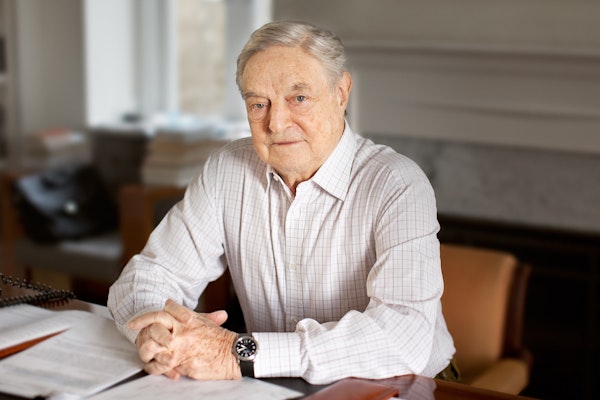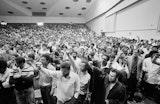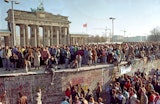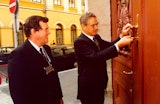George Soros speaks at an event on day three of the World Economic Forum (WEF) in Davos, Switzerland, on Thursday, Jan. 23, 2020. (Simon Dawson/Bloomberg)
On a very warm day in late June 2019, I got onto the tram near the Budapest train station. I found a seat between people holding bouquets, beaming. We were all going to the Palace of Arts for Central European University’s last graduation in Budapest.
CEU was founded by George Soros in the early 1990s. It was meant to be both a place where students from the region could get a first-class education and, maybe more importantly, a counter to the nationalism that could have easily consumed Central and Eastern Europe after the dissolution of the Eastern Bloc. It became a world-renowned institution of higher education. So, too, did it become a target of Viktor Orbán’s government, which passed a law that essentially forced most of CEU’s operations out of the city. From the beginning, it had been an improbable reality, attacked by politicians when convenient. But that, to those who loved it, just underscored its importance. On the one hand, Soros himself created something that would not have existed without his billions. On the other, all those billions were not enough to create conditions in which that something could persist.
I’ve thought of this often in the year that’s followed. I think of it, for example, when conspiracy theorists allege that Soros is the puppet master controlling protests against police brutality. It’s a ludicrous claim, one that strips agency from the individuals fighting for an end to systemic violence against black Americans. But it resonates in part because Soros has given money to, among other things, criminal justice reform. Here, too, there is a befuddling irony: Soros’s money has arguably led to real gains in the criminal justice space. And yet, if money was less concentrated, especially in the hands of men like Soros, perhaps people would not need to rely on billionaire philanthropists for change.
“That is a real conversation that has really erupted in a mainstream way … the question is, how do you give in ways that reduce the power of rich people?” Anand Giridharadas, author of “Winners Take All: The Elite Charade of Changing the World,” told me. “I do think he really has an opportunity here.”
Soros has, in his own way, thought about these issues, or at least about how to more equitably distribute wealth. Scrolling through my phone as I waited for the ceremony to begin back at the Palace of Arts, I noticed that Laura Silber, Open Society’s top communications official, had tweeted out a New York Times article. It was about an open letter published on the website Medium in which a collective of very rich individuals called for “a moderate wealth tax on the fortunes of the richest one-tenth of the richest 1 percent of Americans — on us.”
Signatories included Abigail Disney, Facebook co-founder Chris Hughes, and George Soros, whose photo the Times had selected to adorn the virtual page. “A Message from the Billionaire’s Club: Tax Us,” the headline read. Alexander Soros, the son who Soros has signaled is interested in carrying on his work, had signed on, too. READ MORE...







